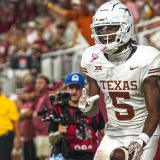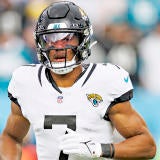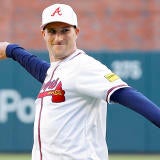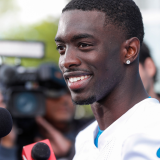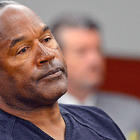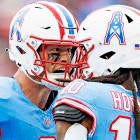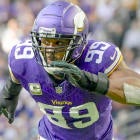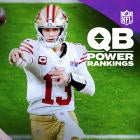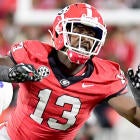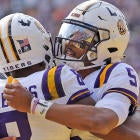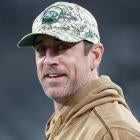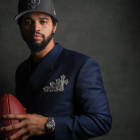O.J.: Made in America, the much-anticipated ESPN documentary, made its debut Saturday night and Part I of the sprawling five-part series didn't disappoint in revealing new truths about one of the most chronicled figures in recent American history. Here are six things we learned:
O.J. stole his best friend's girl
Al Cowlings, Simpson's longtime friend who famously drove the white Bronco on June 17, 1994, was loyal to a fault. Case in point: Another childhood friend, Joe Bell, recounted how in high school Simpson stepped in and stole Cowlings' girlfriend from him -- and eventually married her. Bell said Cowlings struggled with a stutter but had found a "nice girl" in Marguerite Whitley. But that nice girl wound up with Simpson after O.J. picked her up on the way to a party.
Cowlings was furious when he saw his friend arrive with his girlfriend, shaking the car by pushing on the roof, before Whitley told him to "stop it." Simpson married Whitley in 1967 when he was 19, and she was 18, and the couple had three children together before Simpson began an affair with Nicole Brown in 1977 that ended his first marriage. Cowlings stuck by O.J.'s side through it all.

O.J.'s father was gay, according to friends
Simpson was raised in the housing projects of San Francisco, with his father, Jimmy Lee, mostly out of the picture, and his mother working a graveyard shift at a local hospital to provide for the family. Simpson's father popped in from time to time to help pay bills, but O.J.'s friends recounted how the Juice's real role models were the hustlers and players of the neighborhood.
OJ Simpson grew up in the projects in San Francisco where he and his friends were "hustlers." #OJMadeInAmericahttps://t.co/1I19JFrplx
— ESPN Films 30 for 30 (@30for30) June 12, 2016
One childhood friend, Calvin Tennyson, told a story about how he learned Simpson's father was gay after going with O.J. to his father's house.
"One day we went over to his dad's house, and we knocked on the door," said Tennyson. "And when his dad opened the door, he was in a bathrobe, which is not a crime. But then his dad kind of opened the door more, and there was a guy in the back in a bathrobe too. So it was obvious that his dad was gay."
Tennyson told the story to Bell, but Bell says he never talked to Simpson about his dad's sexuality.
"Back in our day, that was the worst thing in the world that you could ever think about," Bell says.
Jimmy Lee Simpson died in 1986, reportedly from AIDS-related complications.
O.J. wanted nothing to do with civil rights
While other iconic black athletes of his generation like Muhammad Ali, Jim Brown, Bill Russell and Kareem Abdul-Jabbar pushed for social progress, Simpson stayed on the sidelines. Of a proposed boycott of the 1968 Olympics by African-American leaders, Simpson told an interviewer: "I'm not too well enlightened on the situation. I don't know exactly what they're trying to do."
Simpson was approached by activist Dr. Harry Edwards, who urged him to stand with his fellow black athletes. But Edwards says Simpson didn't see himself as a black athlete, telling Edwards: "I'm not black, I'm O.J."
O.J. made White America comfortable
The "I'm not black, I'm O.J." view was shared among the corporations who hired Simpson to pitch their products, most famously Hertz Rent-A-Car. Former Hertz CEO Frank Olson recounted how he saw O.J. as colorless:
"To us, OJ was colorless." - Frank Olson, Former Hertz CEO #OJMadeInAmericahttps://t.co/20qBWGEW21
— ESPN Films 30 for 30 (@30for30) June 12, 2016
Still, ad execs made a point of using white people rooting on O.J. running through airports in those Hertz commercials as a way to reassure white audiences.
The commercial director Fred Levinson even said: "He's African, but he's a good-looking man ... he almost has white features."
O.J. had a gift for talking himself out of trouble
Bell told another high school story about when he, Simpson and Cowlings -- all members of the football team -- were busted by a coach playing dice in the bathroom. Despite Simpson's pleas, the coach led Simpson, Bell and Cowlings to the principal's office. Bell recalls how Simpson walked in back of the group, and as the coach left the office, O.J. left with him. The school's dean stopped Simpson to ask where he was going and he explained that he was just helping the coach bring his friends down to the office. Bell laughed at the story, while Cowlings says in a videotaped deposition after the 1994 murders of Nicole Brown and Ron Goldman that "I've seen O.J. talk his way out of a lot of situations."
There was trouble from the start with O.J. and Nicole
Nicole Brown was just 18 when she first met O.J. Simpson. She was working as a waitress at the Daisy, a private L.A. club frequented by celebrities. Upon first setting eyes on her, Simpson remarked to a friend, "I'm going to marry that girl."
When OJ first met 18-year old Nicole Brown... it was love at first sight. #OJMadeInAmericahttps://t.co/DYnJFfcCue
— ESPN Films 30 for 30 (@30for30) June 12, 2016
Simpson, despite being married, and Brown just out of high school, went on a date and a friend of Brown's, David LeBon, remembers waiting up for her to get home. When she arrived, after 2 a.m., LeBon recalled that Brown had ripped jeans. He asked what had happened and Brown told him that O.J. had been "a little forceful."
The second installment of O.J.: Made in America airs Tuesday at 9 ET on ESPN. For a full guide on how to watch the 5-part, 7-hour documentary on ABC and ESPN, click here.







